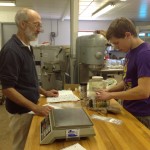What to expect from an Athens’ Own internship
The Athens’ Own motto is: “Vision, act on your vision, network your actions”. We have a vision of creating an educational internship program, which helps to address some of the “teaching to the test” gaps of the traditional education system, and to nourish a thorough understanding of sustainability and resilience. Communicating our methods of teaching is a particularly challenging task, since our internships are based on situational learning, and do not have a written plan. It may be unusual, but it is set up that way intentionally.
We have both very high and rather low expectations for our interns. We expect above-average, enthusiastic and active participation from our interns, (you won’t be just fetching coffee for your superiors), but the main intern assignment is quite basic: just be present and learn. If you have a sincere desire to learn, and demonstrate that desire, the internship is really quite simple. This paradox presents an array of challenges to the students we mentor. Specifically, how do we claim to have an advanced program, but have no program guidelines? If you are confused about our program, don’t worry, that is the point. It is all related to our goal of building resilience.
Here’s what we know: The world needs outstanding, skilled people who are willing to fight for a better society. This doesn’t mean our interns will be “fighting” by blocking tanks or tying themselves to ancient oak trees, but it does mean that they will be constantly, tirelessly, and optimistically working to make change. Whether that comes in the form of writing letters, organizing events, educating the public, or working with special organizations is entirely dependent on each intern’s skills and passions. Students should come to us and say: “Here is what I know, here is what I can do, and I want to learn more. How can I help?” More importantly, they should know that just by being involved, they will expand and evolve that category of “what I know and what I can do”, hopefully to the point of self-generating a future job.
How, then, does an intern approach this unique situation? My suggestion is to step into the mindset of a “resilience recruit”, headed to boot camp. We are already proud that you put on your uniform and made the decision to get up and go there. So now your question is, “Where am I going and what am I going to do?”. I’d wager that if the answer came back as: “You’re going to build resilience”, you still wouldn’t have a clue. Here is where the simplistic part comes in: We think that is a good thing. Considering the very definition of resilience is “postitive adaptation to change”, what better way to test your resilience than to step into a realm where you aren’t sure what will happen next? By approaching every day and every task with an openness and a sincere desire to learn, what you get back will be a hundred times greater than what you put in.
So you arrive at your first day as an intern, at “resilience boot camp”, and your supervisor claims you will be working in a soup kitchen today. I know, I never mentioned anything about working at soup kitchens in my earlier descriptions of this internship. So how are you going to progressively adapt to this situation? You could start by finding out where to get an apron, where and when to be there, and what the guidelines are for volunteers. Then you could make an effort to talk to everyone you meet, take notes, and gain as much as possible from the situation. At the end of the day, you learn that tomorrow you will be helping Constantine pick up grain from Jackie O’s. How are you going to prepare for and respond to that situation? These are only just a few examples, but you get the idea.
Of course, resilience is not limited to a personal readiness to jump in and make the most of what you’ve got. However, it’s nearly impossible to truly understand resilience without a healthy awareness that the unknown is out there lurking, and you not only can but should be ready to stand up and take on anything. And when you get outside of your comfort zone, you will find that is where the most intense learning takes place. So we understand that this experience is new and strange, but we are here to help you get the most out of it, and to help facilitate the direction you will go next, once you get out there and start blazing the trail.
—
My name is Alyse Carter, and at the time of this writing, I was the Internship Coordinator, and the Liaison/Public Information Officer for Athens’ Own.




